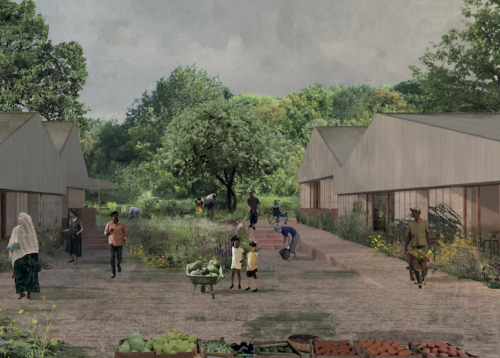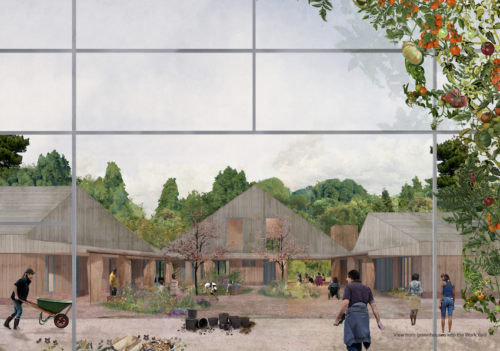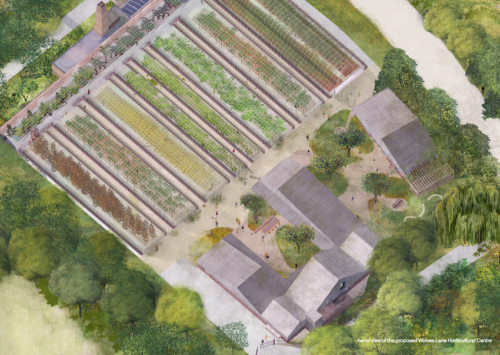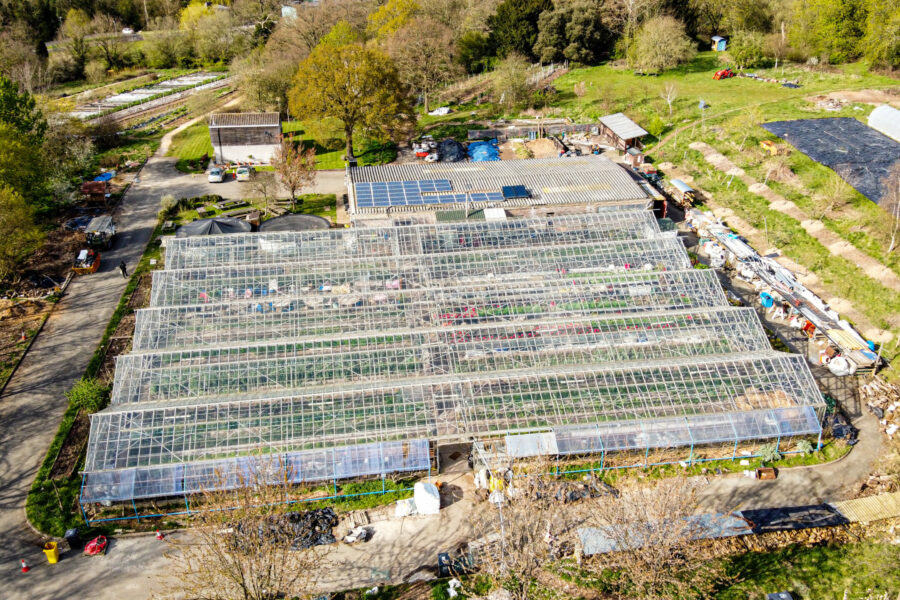In March 2020 OrganicLea was awarded £1.2 million from the Mayor of London’s Good Growth Fund that will see the vision of a Market Garden City come to life.
The funding will help OrganicLea and the Wolves Lane Consortium to create new facilities that will support two flagship food growing sites in Waltham Forest and Haringey to thrive as vital pieces of community infrastructure in London.
The Market Garden City project aims to create new and expanded opportunities for local communities to engage in sustainable food growing, food distribution, healthy eating and cooking, and nature connection through volunteering, training, employment and enterprise, at Hawkwood Nursery in Chingford and at Wolves Lane Nursery in Wood Green. At Wolves Lane, OrganicLea is working in a Consortium with the Ubele Initiative and Crop Drop and local volunteers to renew the dilapidated facilities and develop a thriving community hub. Architects Pedro Gil and Paloma Gormley have been working closely with us on our plans for the new facilities, which will provide a crucial example of low-impact construction techniques and materials that can be delivered at scale, which the construction industry urgently needs to adapt to in the face of the climate emergency.
Our aim is for sites that we can be proud of, with robust and inspiring facilities, built in line with our ethics to the highest standards. With the improved facilities we will be in a position to increase the delivery of inclusive and practical-based opportunities for people to develop their skills around food growing and much more. We will also have a proven model which can be taken up in other boroughs where similar nursery infrastructure exists or where strategies around climate change, green space, equality and good growth could be delivered through similar common good land use. Thus our vision of London as a Market Garden City can be realised.
Hawkwood Nursery has already undergone refurbishment including glasshouse renovation, new indoor and outdoor classrooms, and upgrading of kitchen and bathroom facilities. Good Growth Development Funding has now enabled a more strategic and longer term development plan for the site. The next phase of capital development will provide:
- Additional formal and informal classroom and activity space, including small meeting rooms for tutorials and confidential referral meetings
- Renewable energy and water harvesting installations
- Expanded and improved operational space including ambient and cold storage, processing facilities, office space and farm shop

Wolves Lane Horticultural Centre requires a fuller overhaul to prevent further dilapidation, reduce ongoing maintenance and provide designed facilities. This will include:
- New public events/community space which connects people with the outdoor and indoor growing spaces, allowing reallocation of glasshouses currently used for this
- Replacement of poorly maintained office and classroom spaces with fully insulated designed new facilities for operational and community learning activity
- Glasshouse refurbishment, including ventilation and irrigation systems
- Renewable energy and water harvesting installations
- Upgrade of existing kitchen and bathroom facilities

The Good Growth funding has enabled us to develop full masterplans for both sites, and provides capital for the first phases of implementation (a Community Hub and Classroom/Office/Warehouse buildings at Wolves Lane, and a Classroom/Office/Cloakroom building at Hawkwood), with further capital being sought to deliver additional phases. Planning application processes are underway with the aim to begin construction during summer-autumn 2021 and complete by late spring 2022.
We plan to implement these developments in line with our values of ecologically sound and socially just operation, which means that we have involved our communities in the design process, and will also:
- Adapt and make use of what already exists on site as much as possible
- Make use of sustainable materials as much as we can, and seek to absolutely minimise the carbon footprint of the works
- Design the site layout, access and signposting so that we can continue to operate working sites whilst also safely welcoming a wide range of visitors and participants, involving people in elements of construction as participatory and skills development opportunities
With refurbished and new facilities created, we will see a period of expanding activity, with increase in produce grown and distributed from both sites, increased employment and training opportunities, and further enterprise incubation and community learning. This period will see the development of horticultural therapy and social prescribing services and opportunities for people to engage with green space and nature connection, as well as continuing our support for new entrants into horticulture, especially those from BAME communities. We will develop venue hire as an income generation stream and seek funding for revenue support, especially at Wolves Lane whilst food production and training income there is still reaching full potential. We will be in a position to provide replication support in the form of reports, visits, consultancy and open source sharing of our business plans and financial modelling with other community organisations, local authorities and other interested parties.
We’re excited to set a powerful precedent for the integration of community and green space in London, starting in Waltham Forest and Haringey.






